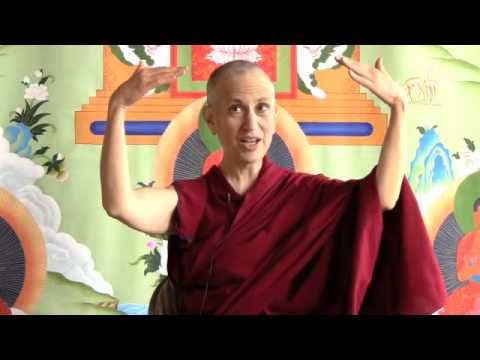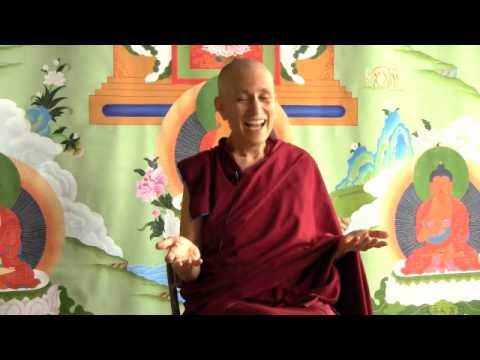The carnivorous demon of doubt
The carnivorous demon of doubt
A Crown Ornament for the Wise, a hymn to Tara composed by the First Dalai Lama, requests protection from the eight dangers. These talks were given after the White Tara Winter Retreat at Sravasti Abbey in 2011.
The Eight Dangers 20: The carnivorous demon of doubt, part 1 (download)
Okay. So we’re on the last danger. Well, not the really last one, but the last one in these verses. It’s called the carnivorous demon of doubt.
Roaming in the space of darkest confusion,
Tormenting those who strive for ultimate aims,
It is viciously lethal to liberation:
The carnivorous demon of doubt—please protect us from this danger!
We’re requesting Tara’s wisdom to protect us from this.
So, “roaming in the space of darkest confusion.” That means based on ignorance. So the mind is … and by ignorance we don’t just mean, like, not being able to see ultimate reality clearly. We mean grasping it to exist in the opposite way from how it actually exists. And so when we say “confusion” here, we’re not just talking about confusion like you got up in the morning and you can’t find your slippers. We’re not talking about confusion like that. Or confusion like after you’ve gotten drunk. We’re talking here about the ignorance that lies at the root of samsara.
So, “roaming in the space of darkest confusion, tormenting those who strive for ultimate aims.” The ultimate aims are liberation and, of course, enlightenment. Liberation if you are a hearer or solitary realizer practitioner. Full enlightenment, or full awakening, if you are a Mahayana practitioner. And so if you’re really focused on liberation or enlightenment, doubt torments you. It becomes something that completely won’t let you be in peace. It won’t let you follow the path and follow your aim, and go where you want to go, because you’re stuck there going, “Well should this,” or, “is it this way or that way?” And so that’s why they always say that trying to practice—with that kind of doubt—is like trying to sew with a two-pointed needle, you know, you just can’t get anywhere.
And so we can stand there and just go, “Well, is the Buddha a good guide, or not a good guide? Is the Dharma true or is it not true? Does the Sangha exist or not exist? Is my mind really the source of happiness and suffering, or … maybe there’s God … maybe there’s the President, or there’s my husband … they’re the cause of my happiness and suffering.” Something external. And you know, you can’t reach any conclusion. And you’re standing there, and this is the kind of doubt that is mostly inclined towards the wrong conclusion. Not the doubt that’s going towards the right one. So it’s a deluded doubt.
And so, you kind of want to practice, but then your mind won’t let you because you’re not sure if practice leads anywhere, if it’s worthwhile. You even doubt the instructions, so you don’t know how to practice. “Do I do breathing meditation, or do I do analytic meditation? Maybe I should do some visualization. There are too many things. What do I practice?” We’re all very familiar with it, aren’t we?
So this kind of doubt torments us. And if we don’t get any clarity we just sit in it and do any real practice, because our mind won’t let us.
Kind of, “Oh, well, tantra’s the highest thing, so maybe I should do that now. But then I don’t have the right foundation, but I can get that later. But what’s the right foundation anyway? I don’t really know.”
So then we can’t move.
And I think one of the tricky things about doubt is that often we don’t recognize it as an affliction. We just stay in that state of confusion and perplexity without saying to ourselves, “Oh, this is an afflicted state of mind. Yeah, I don’t really think practice is very worthwhile. Anyway, I can’t do it right even if I did.” You know? These kinds of doubts. Doubting ourselves, the path, doubting everything. And we don’t recognize it as an affliction. We think that it’s a proper way to think. In fact, we think most of our afflictions are the proper way to think. And that’s why we are “roaming in the space of darkest confusion.” [Laughter]
That’s a start on doubt. We’ll talk a little bit more about it. But you know, try just—when your mind gets in that state—especially because your mind is so unhappy and so tormented—try stepping back and saying, If your mind is unhappy and tormented, there’s affliction present. Okay? So step back and say, “What affliction is this?” And often, in this kind of thing, you’ll say, “Oh, it’s doubt.” It’s not anger, is it? It’s not resentment. But it’s doubt.
Venerable Thubten Chodron
Venerable Chodron emphasizes the practical application of Buddha’s teachings in our daily lives and is especially skilled at explaining them in ways easily understood and practiced by Westerners. She is well known for her warm, humorous, and lucid teachings. She was ordained as a Buddhist nun in 1977 by Kyabje Ling Rinpoche in Dharamsala, India, and in 1986 she received bhikshuni (full) ordination in Taiwan. Read her full bio.


